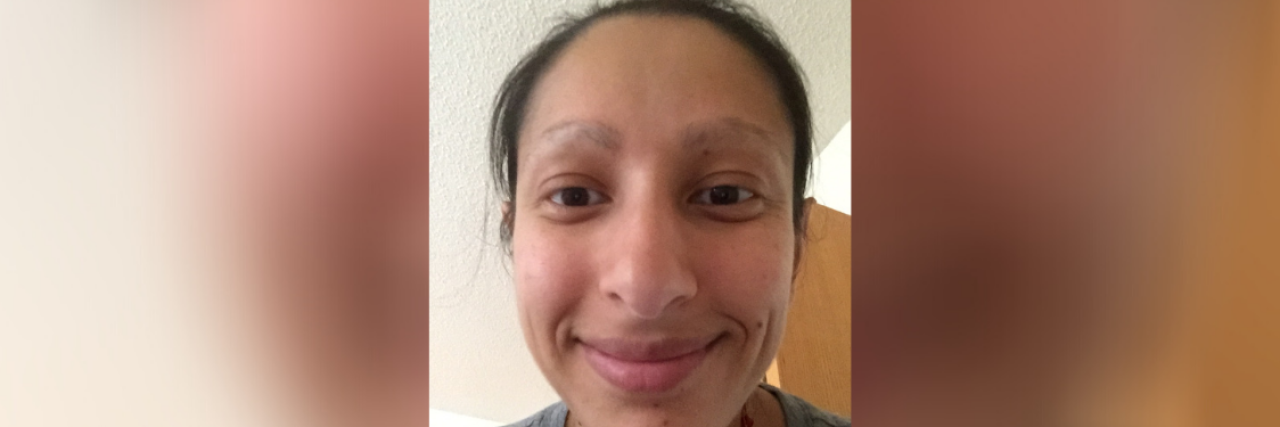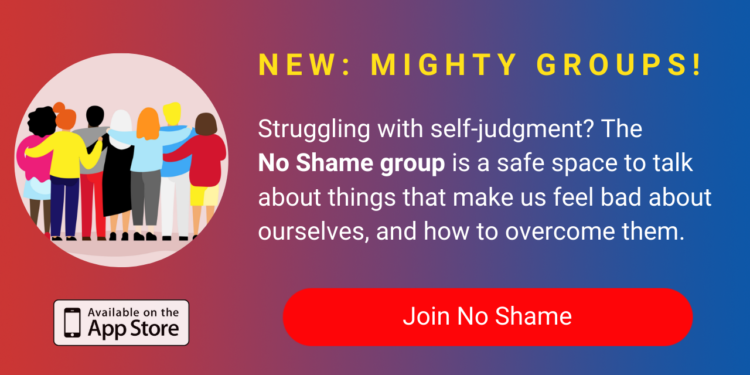Living with trichotillomania, like many mental health conditions, can be oh so very isolating. As much as I wanted to share my experience as a child pulling out my hair at the young age of 12, I was prevented from doing so because of fear.
I feared people would think I was weird and wrong for doing this damage to myself. I feared being judged. I feared being seen as losing control. So I kept quiet. But what I really wanted to share back then was that my dad was sick with cancer and I didn’t know how to deal with it. I wanted to share the pain I was going through in losing him. But, it was the 90s, I was just a kid, and we as a society weren’t as open about our lives back then. So, I didn’t talk about my dad’s sickness. Not with teachers, not with friends, not with my mom, not with my sister. By holding it all in, by pushing the pain down, I wound up getting sick too, as I turned to compulsive hair pulling as a way to cope with the stress of it all.
Over the next 20 plus years, pulling out my eyebrow hairs and eyelashes became my go to soothing mechanism for stress, anxiety, even boredom. I spent countless hours each day covering up the pulling from the night before with a black eye pencil. I even learned to balance the pulling — a little from the left, a little from the right, to make it harder for others to notice something was missing. I had gotten so good at hiding that it got to a point where even I couldn’t see what was happening.
Then, a few years ago, my husband caught me without eyebrows. Yes, even the man I promised to share my life — in sickness and in health — had no idea about my mental health condition. Years of practice in concealing it will do that!
And that is when I realized, “secrets make us sick.” That sentiment rocked my world and changed my life.
I had spent so much time and energy hiding in fear. The secret of hair pulling was creating a vicious cycle of negative self speak and more pulling. It was baggage I carried for decades, impacting every decision from education to career to social circles. Feeling like I couldn’t tell anyone made life harder and more lonely despite being surrounded by loving friends and family.
In more detail, here are three ways my trichotillomania secret made me sick:
1. Hiding From Myself
By hiding it from others I had to learn to ignore and deny the behavior from myself. The irony is this feeling of being ignored and invisible in elementary school was another trigger for my hair pulling. In hiding from myself, I almost felt invisible — this idea of “If I can’t see my face, it’s not there…and others can’t see it too.” So I avoided mirrors, and in time I learned to avoid seeing myself and being seen. I still remember in elementary school chorus, at the Nth hour begging the chorus teacher to switch a singing solo with a friend’s speaking part. I didn’t want attention on me. Later I realized social anxiety and selective mutism may have played a role too. I imbibed a chaotic mental health cocktail and didn’t even know it. This lack of knowledge cloaked and prevented my healing.
2. Negative Self-Speak
“They” say “you are your own worst enemy” and “you are your biggest critic.” I hope its not the case for you, dear reader, but for me it most definitely was. I treated myself like garbage. In my late 30s, I am now just trying to unlearn the language. If I had done something wrong as a child, I didn’t need to be berated by my parents, because I did the yelling at myself in my own mind: “how could you be so stupid?” or “what is wrong with you?” And that was just little things, like spilling milk accidentally.
When it came to my hair pulling, my inner voice was even more of a bully: “you’re so ugly. Why are you doing this? You are never going to find love looking like that…”
This negative chatter lead to low self confidence and impacted many decisions — mostly around quitting things — from saxophone and basketball (“you’ll never be good enough?”) to friends (“why do you think they even like you?) to creative arts activities (“you aren’t creative.”)
Each strand of hair pulled from age to 12 to age 32 was a blow to my psyche, making the act of seeking help intolerable.
3. Time and Energy Waste
When I was pulling, I would spend anywhere from a few minutes to a whole hour locked in a bathroom. To hide the pulling, it only took a few minutes — and a few strokes — of a black eye pencil. No big deal, right? Wrong. It was the time spent outside of that which became more of a waste — constantly wondering if people were looking me in the eye, not because I had something important to say, but if they were trying to figure out that my lack of eyelashes was the reason I didn’t look right. It was those hours in class or work meetings where my inner voice would trail off and lose focus.
Despite all the pain endured, I hid my hair pulling disorder because I didn’t know there were other options. After being caught, I had someone to talk to, someone who cared enough to try and understand — and support me.
I realized that not only the hair pulling behavior, but also the act of concealing the pulling was preventing my healing. Acknowledging that my hair pulling secret was making me sick changed my life. With my husband supporting me, I found a path to healing and recovery. I now work to encourage others to do the same as the founder of a mental health tech company and by advocating awareness of trichotillomania and body-focused repetitive behavior in the mainstream. Once I accepted this chronic condition as something to manage rather than to stop or hide, I dropped the baggage of my secret and learned I could take control and overcome trichotillomania.
It’s not easy to look inward and really try to see what is going on. But if you have the time and energy, I highly recommend looking at how you can go from concealing to healing, because “secrets make us sick.”
Image courtesy of contributor: “This is Aneela before she had the keen awareness to take control of her hair pulling!”


